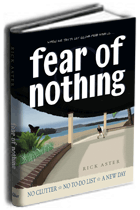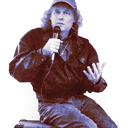In his 2001 book The Future of Success, Robert Reich devotes most of a chapter to reasons why work is taking over our lives. If our financial fortunes have declined, we may have to choose between working longer hours and reducing our standard of living. Or, if we are prized, highly paid workers, the financial rewards for working more are higher than they ever been. In the meantime, for all workers, the sense of certainty about future income is less than it was a generation ago. If you have a job now, you might not have one at the end of the year. Or, if you have highly marketable skills, those skills might fade or become less important or less distinctive in just a few years. You have to make money while you can. Even if you are making plenty of money, you might have to maintain a fast pace of work just to keep your career on the fast track or keep up with your field.
At the same time, communication devices and channels make it easy for work to spill out of its usual place and time slot. Phone calls and e-mail go with you, if you choose, and you might very well choose to stay connected in order to not miss a chance to do some work, knowing how uncertain the future is.
I experienced most of these effects myself this year, spending most of my waking hours on a rewrite of a book — that effort in addition to a full-time work schedule during a significant part of that time. The book I was working on was a computer book that had not been updated in 13 years, almost forever in computer terms, so it was almost like writing a new book. Once I committed to completing the new edition, I wanted to set everything else aside, or as much as I could, and finish the book, to remove the financial uncertainty (and, yes, the emotional suspense) that goes with having a large project that’s not yet complete and not yet making any money. Of course, I wanted to deliver the book before I would have to update it again. I wanted to keep up my reputation as an author in this field, and that’s a reputation that could fade in just a few years if my books aren’t kept up to date. At the same time, I wanted to avoid the lifestyle compromises I might have to face if I couldn’t make up some of the income I’m not receiving in my banking work during that industry’s ongoing decline. The notepad app on my mobile phone made it possible for me to keep at my writing project even when I found myself at inconvenient places — the afternoon when I was waiting in line for a driver’s license photo, for example. This means that most of the effects from Reich’s book that drive people to work long hours applied to me this year.
As you can imagine, whole areas of my life just fell away. When I emerged from this large-scale work effort a few days ago and took a new look at my possessions — somewhat scattered about my house, because I hadn’t taken the usual time to keep them organized — they didn’t look nearly as relevant to my life as they had seven months earlier.
I had already noticed that I wasn’t wearing all the clothing I owned. During my seven-month book-writing spree, I wore the same 30 or so things over and over again. If the rest of my clothing had disappeared, it almost wouldn’t have mattered.
This change in perspective makes it easier to throw away things that, last year, I was still holding on to. Yesterday I discovered my boxes of blank audio cassettes and said, “What on Earth was I saving these for?” Of course, that’s easier to say now that audio cassettes are one year farther out of style, but the important thing is that I’m bringing a new perspective to my stuff, and aligning it more accurately with what I’m likely to be doing.
I know people who have gone all-out in their careers for a few years at a time. When you are working 11 hours a day, you can get by with surprisingly few possessions, and surprisingly little in the way of a home. It makes a certain kind of sense, if you’re going into that pattern for an extended period of time, to pretty much stop buying stuff, and postpone the process of setting up a home until you have time to actually do it.
Reich, in his book, has a chapter about what the expansion of work is doing to families. The biggest change he points to is that married couples are having fewer children. Looking at the houses some of them live in, you can see a related change there, with more houses that go unoccupied for most of the day. If work expands, personal possessions become less important, and home is no longer much of a gathering place. It’s no surprise that people are starting to cut back on the stuff they keep, and often, on the size of their homes.



No comments:
Post a Comment